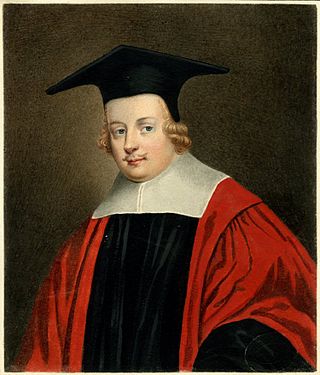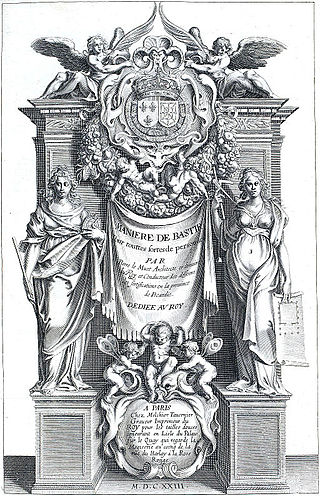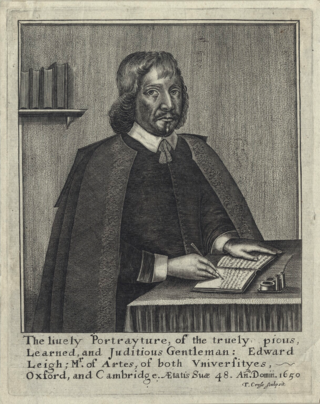Related Research Articles

William Prynne, an English lawyer, voluble author, polemicist and political figure, was a prominent Puritan opponent of church policy under William Laud, Archbishop of Canterbury (1633–1645). His views were presbyterian, but he became known in the 1640s as an Erastian, arguing for overall state control of religious matters.

Henry Hammond was an English churchman, who supported the Royalist cause during the English Civil War.

George Chapman was an English dramatist, translator and poet. He was a classical scholar whose work shows the influence of Stoicism. Chapman has been speculated to be the Rival Poet of Shakespeare's sonnets by William Minto, and as an anticipator of the metaphysical poets of the 17th century. Chapman is best remembered for his translations of Homer's Iliad and Odyssey, and the Homeric Batrachomyomachia.
The 1711 Sales Auction Catalogue of the Library of Sir Thomas Browne highlights the erudition of the physician, philosopher and encyclopedist, Sir Thomas Browne (1605-1682). It also illustrates the proliferation, distribution and availability of books printed throughout 17th century Europe which were purchased by the intelligentsia, aristocracy, priestly, physician or educated merchant-class.

Nathaniel Fiennes was a younger son of the Puritan nobleman and politician, William Fiennes, 1st Viscount Saye and Sele. He sat in the House of Commons at various times between 1640 and 1659, and served with the Parliamentarian army in the First English Civil War. In 1643, he was dismissed from the army for alleged incompetence after surrendering Bristol and sentenced to death before being pardoned. Exonerated in 1645, he actively supported Oliver Cromwell during The Protectorate, being Lord Keeper of the Great Seal from 1655 to 1659.

Thomas Creech was an English translator of classical works, and headmaster of Sherborne School. Creech translated Lucretius into verse in 1682, for which he received a Fellowship at Oxford. He also produced English versions of Manilius, Horace, Theocritus, and other classics.

Eberhard III, Duke of Württemberg ruled as Duke of Württemberg from 1628 until his death in 1674.

Sir Edward Rossiter, 1 January 1618 to 9 January 1669, was an English landowner, soldier and politician from Lincolnshire. He fought with the Parliamentarian army in the Wars of the Three Kingdoms and sat as an MP at various times between 1646 and 1660.

Thomas Farnaby was an English schoolmaster and scholar. He operated a successful school in the Cripplegate ward of London and enjoyed great success with his annotations of classic Latin authors and textbooks on rhetoric and Latin grammar.

Pierre Le Muet was a French architect, military engineer, and writer, famous for his book Manière de bâtir pour toutes sortes de personnes, and for the châteaux he constructed, most notably Tanlay in Burgundy, as well as some modest houses in Paris, the grandest of which, the Hôtel d'Avaux (1644–1650) survives and has recently been restored to a semblance of its seventeenth-century condition.

Col. Thomas Dent Sr., Gent. (1630–1676), Justice, Sheriff, and member of the Lower House of the Maryland General Assembly.
Sir Philip Stapleton of Wighill and of Warter-on-the-Wolds, Yorkshire was an English Member of Parliament, a supporter of the Parliamentary cause during the English Civil War. His surname is also sometimes spelt Stapylton or Stapilton.

Michel de Marolles, known as the abbé de Marolles, was a French churchman and translator, known for his collection of old master prints. He became a monk in 1610 and later was Abbot of Villeloin (1626–1674). He was the author of many translations of Latin poets and was part of many salons, notably that of Madeleine de Scudéry. He is best known for having collected 123,000 prints - this acquisition is considered the foundation of the cabinet of prints in the royal library, though it was only constituted as a department in 1720.

Sir Edward Leigh was an English lay writer, known particularly for his works on religious topics, and a politician who sat in the House of Commons from 1645 to 1648.
Robert Baron was an English poet and dramatist. He was a very successful plagiarist, his thefts passing unrecognised for more than a century after his death.

The Gresham College group was a loose collection of scientists in England of the 1640s and 1650s, a precursor to the Royal Society of London. Within a few years of the granting of a charter to the Royal Society in 1662, its earlier history was being written and its roots contested. There is still some debate about the effect of other groups on the way the Royal Society came into being. The composition of those other groups is unclear in parts; and the overall historiography of the early Royal Society is still often regarded as problematic. But this group has always been seen as fundamental to the course of events.
Robert Scawen (1602–1670) was an English politician who sat in the House of Commons at various times between 1640 and 1670. He supported the Parliamentary cause in the English Civil War.
Sir Thomas Higgons was an English diplomat and politician who sat in the House of Commons at various times between 1659 and 1687.
Christopher Harvey (1597–1663) was an English clergyman and poet.
Edmund Gayton (1608–1666) was an English academic, physician and author, now considered a hack writer.
References
 This article incorporates text from a publication now in the public domain : "Stapleton, Robert". Dictionary of National Biography . London: Smith, Elder & Co. 1885–1900.
This article incorporates text from a publication now in the public domain : "Stapleton, Robert". Dictionary of National Biography . London: Smith, Elder & Co. 1885–1900.